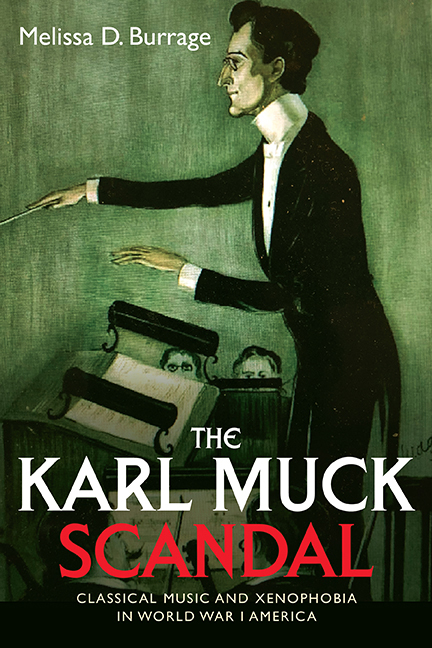Book contents
- Frontmatter
- Dedication
- Contents
- Introduction
- 1 Here on Foreign Shores: Dr. Karl Muck's Acclaim in Boston (1906–1918)
- 2 Mobilization: A Changing Environment for Boston (1917)
- 3 Selling the War: Demonizing the Enemy (1918)
- 4 “Looking for the Trump Card”: Mrs. William Jay's Attacks on Karl Muck in Wartime America (1915–1918)
- 5 “A Leaf in the Storm”: Muck, Higginson, and the Boston Symphony Orchestra (1918–1919)
- 6 Muck's Arrest: “Finding ‘One Weak Spot’” (1918–1919)
- 7 “Only Too Proud to Shoulder It All”: The Sexual Climate of Wartime Boston and Muck's Fall from Grace (1918–1919)
- 8 Muck's Final Years: His Association with the Wagners and Adolf Hitler (1920–1940)
- Coda (1919 to Present)
- Acknowledgments
- Notes
- Bibliography
- Index
- Eastman Studies in Music
1 - Here on Foreign Shores: Dr. Karl Muck's Acclaim in Boston (1906–1918)
Published online by Cambridge University Press: 06 September 2019
- Frontmatter
- Dedication
- Contents
- Introduction
- 1 Here on Foreign Shores: Dr. Karl Muck's Acclaim in Boston (1906–1918)
- 2 Mobilization: A Changing Environment for Boston (1917)
- 3 Selling the War: Demonizing the Enemy (1918)
- 4 “Looking for the Trump Card”: Mrs. William Jay's Attacks on Karl Muck in Wartime America (1915–1918)
- 5 “A Leaf in the Storm”: Muck, Higginson, and the Boston Symphony Orchestra (1918–1919)
- 6 Muck's Arrest: “Finding ‘One Weak Spot’” (1918–1919)
- 7 “Only Too Proud to Shoulder It All”: The Sexual Climate of Wartime Boston and Muck's Fall from Grace (1918–1919)
- 8 Muck's Final Years: His Association with the Wagners and Adolf Hitler (1920–1940)
- Coda (1919 to Present)
- Acknowledgments
- Notes
- Bibliography
- Index
- Eastman Studies in Music
Summary
Incredibly, here on foreign shores,
The fame of our fathers’ blooms anew,
An all-Germanic holy place,
Rises up with supernatural speed.
—Kuno Francke, 1903On October 2, 1906, just twenty days shy of his forty-seventh birthday, Dr. Karl Muck and his wife, Anita, boarded the first-class section of the North German Lloyd Kaiser Wilhelm der Große in Bremen bound for the United States. This was the couple's first voyage across the Atlantic. Muck had been hired as conductor of the Boston Symphony Orchestra, where he would remain until 1908, ultimately returning to Boston in 1912 for a second term until 1918.
The Mucks arrived in Boston to find a vibrant and cosmopolitan city. Its small yet vital German population enriched the community by its presence. Boston's upper classes had been working for decades to make the city a leader in academic and cultural affairs, and German Americans and German institutions abroad inspired this endeavor. In the last half of the nineteenth century, German immigrants had established music businesses and amateur musical organizations in Boston, and, because of their efforts, a growing, musically literate middle-class population developed an insatiable appetite for high-quality classical music. Entrepreneur and BSO founder Henry Lee Higginson saw an opportunity to form a professional orchestra, supported by an enthusiastic community of educated listeners, eager for excellent performances, the sort that Karl Muck and the Boston Symphony Orchestra would offer. Higginson dreamed of replicating in Boston the kind of musical setting that he had enjoyed during his college years in Germany and Austria, recreating a German-style hall, hiring European musicians (most especially Germans), and presenting musical compositions from European masters, creating a world-class orchestra that was part of a single transnational music culture within a European framework.
Karl and Anita Muck lived in Boston during this creative period, when Anglo- and German Bostonians alike were producing highquality cultural “products” for a welcoming market, when the flow of personnel, artistic talent, and intellectual ideas traveled by ocean liner back and forth between Europe and the United States, and when permanent symphony orchestras on both sides of the Atlantic became a ubiquitous part of public life.
- Type
- Chapter
- Information
- The Karl Muck ScandalClassical Music and Xenophobia in World War I America, pp. 9 - 66Publisher: Boydell & BrewerPrint publication year: 2019



